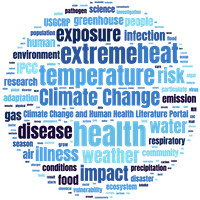News & Articles
Browse all content by date.

With the upcoming presidential election and congressional and senatorial around the country, there’s a lot of talking about the future.
But, too often, the candidates are blaming their opponents for the prob-lems at home and around the world or they’re simply offering blatantly superficial solutions to what are considered complex issues.
You just have to watch the television ads for Trump, proclaiming that immi-grants are criminals and rapists.
When it comes to talking about the future, whether it’s politics, the economy or climate change, we too often look for quick, easy answers that demonstrate a lack of maturity and little appreciation for the complexity of engaging these issues.
Yet, any serious reflection and consideration of how we will address the growing climate emergency requires that we need to explore how we will approach and engage our collective futures at this extraordinary moment.
Tim Harford, in his book Why Success Always Starts With Failure: Adapt, wrote, “Our journey will involve an apparent paradox: the problem of tackling climate change is far more complicated than we tend to think, and failing to appreciate that complexity is precisely what holds us back from pushing ahead with a relatively straightforward solution.”
In the past several weeks, we’ve heard from NASA that 2024 is likely going to be the hottest year on record. Other scientific and media reports have stated that 2024 is tracking to reach a record high yearly atmospheric CO2 increase of 3.2 ppm and countries in Southeast Asia and South America are continuing to break daytime and nighttime heat records.
Here in the U.S., states across the northeast region are on red alert for wildfires and Phoenix broke daily heat records for a three-week stretch.
Throughout his book What We Owe The Future, William MacAskill proposes that we have to find a way of making decisions in the face of an uncertain future through what he calls the expected value theory.
“The value of what we assign to outcomes should be based on whatever it is we ultimately care about, such as people’s wellbeing,” stated MacAskill.
In Duluth, as we face this ever changing and challenging climate emergency, what do we ultimately care about? For Duluth’s future, what could be our highest priorities as we try to navigate climate change’s impact upon everything from public health to food systems and transportation?
As reported on the Lancet: Planetary Health website, the most recent study of young people in the U.S. between the ages of 16-25 who were interviewed about climate change showed that 85% are moderately worried, 57% are extremely worried, 42% indicated that climate change was impacting their mental health and 38% stated that their feelings about climate change was negatively affecting their daily lives.
So, what do we owe young people in Duluth who are sharing these same experiences? We need to provide climate education, create climate support groups and provide spaces for them to learn how they can lead more resilient and meaningful lives in a climate-change world.
The 2018 Climate Vulnerability Assessment for Duluth reported on the major climate events that will take place in our city in the nexr 30 years and its significant impacts on our most vulnerable populations in Duluth; including children under 5 years of age, senior citizens, the poor and homeless, unemployed, people with disabilities and minorities.
Given this assessment and other current studies, what do we owe these vulnerable populations who will be experiencing and struggling with various elements of climate change and are without the resources that others with more privilege have at their disposal? We need to work with all the community and social service organizations that serve these populations by providing community education programs on climate education, environmental justice and presenting personal and community management skills on leading more resilient and sustainable lives.
Whether it’s our young people, the vulnerable populations or future generations in Duluth, we owe it to them and everyone in our city to take this climate emergency seriously. We may not have a clear view or understanding of what is going to happen in the years to come but we have a lot at stake and not being more proactive to addressing climate change is unthinkable.
MacAskill wrote, “What we want to do is build a morally exploratory world: one structured so that, over time, the norms and institutions that are morally better are more likely to win out, leading us, over time, to converge on the best possible society.”
To find and embrace our moral compass in Duluth, what norms and institutions in our city will lead us through this climate emergency and emerge as a more resilient, sustainable and environmentally just community for our young people, our vulnerable neighbors and the next seven generations in Duluth?
| Tweet |


